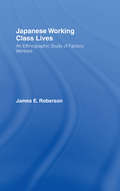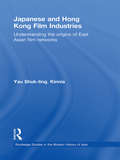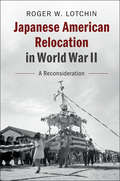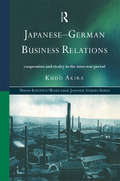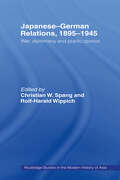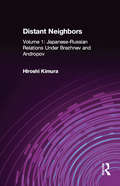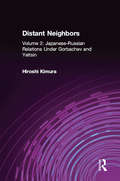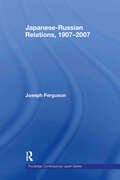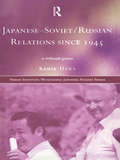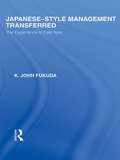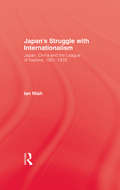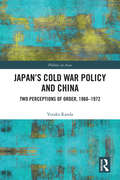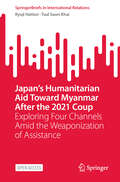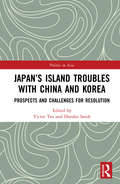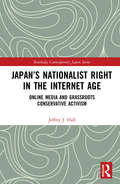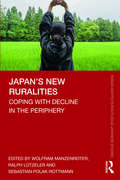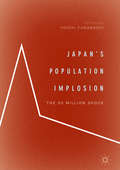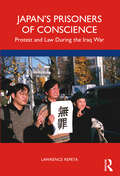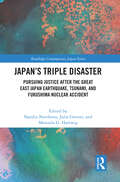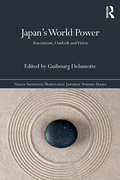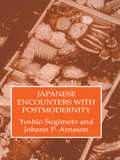- Table View
- List View
Japanese Workers in Protest: An Ethnography of Consciousness and Experience
by Christena L. TurnerThis first ethnographic study of factory workers engaged in radical labor protest gives a voice to a segment of the Japanese population that has been previously marginalized. These blue-collar workers, involved in prolonged labor disputes, tell their own story as they struggle to make sense of their lives and their culture during a time of conflict and instability. What emerges is a sensitive portrait of how workers grapple with a slowed economy and the contradictions of Japanese industry in the late postwar era. The ways that they think and feel about accommodation, resistance, and protest raise essential questions about the transformation of labor practices and limits of worker cooperation and compliance.
Japanese Working Class Lives: An Ethnographic Study of Factory Workers
by James RobersonThis ethnographic study examines the lives of Japanese workers in small firms and analysis their experiences of working life, leisure and education. This unique case study of the Shintani Metals Company illustrates the ways in which employees lives extend beyond their work.Japanese Working Class Lives provides a valuable alternative view of working life outside the large corporations. Roberson demonstrates that the Japanese working class is more diverse than Western stereotypes of be-suited salary-men would suggest.
Japanese and Hong Kong Film Industries: Understanding the Origins of East Asian Film Networks (Routledge Studies in the Modern History of Asia)
by Shuk-ting, Kinnia YauDrawing on first-hand materials collected from the Chinese and Japanese literature as well as interviews with more than twenty filmmakers and scholars Kinnia Shuk-ting Yau provides a solid historical account of the complex interactions between Japanese and Hong Kong film industries from the 1930s to 1970s. The author describes in detail how Japan’s efforts during the 1930s and 1940s to produce a "Greater East Asian cinema" led to many different kinds of collaborations between the filmmakers from China, Hong Kong and Japan, and how such development had laid the foundation for more exchanges between the cinemas in the post-war period. The period covered by the book is the least understood period of the East Asian film history. Filling the gaps surrounding one of the most important but least understood periods of Asian film history this books discusses facts and resources once obscured by controversial issues related to wartime affairs with new insights and perspectives. This book is an invaluable source of information for understanding how the current East Asian film networks came into existence by looking beyond conventional single-case studies and adopting a transnational perspective in tracing the connections between different film industries.
Japanese-American Civilian Prisoner Exchanges and Detention Camps, 1941-45 (Routledge Studies in the Modern History of Asia #3)
by Bruce EllemanThe important and previously undocumented event in the history of the Second World War: the negotiation of 'prisoner' exchanges between the United States and Japan during 1941 to 1943, is examined here by Bruce Elleman.Approximately 7000 American citizens had been arrested by the Japanese authorities while visiting Japan as tourists, conducting business, teaching English or carrying out missionary work. The same amount of Japanese citizens living illegally in the United States had to be repatriated to secure the Americans' release.Challenging the conventional perceptions regarding the role and justification of the detention camp, this insightful book addresses questions regarding the diplomatic agreement between Japan and the United States, the Japanese-American detention camps and the role of one of the most successful minority groups in the United States today: the Japanese-Americans.
Japanese-American Relocation in World War II: A Reconsideration
by Roger W. LotchinIn this revisionist history of the United States government relocation of Japanese-American citizens during World War II, Roger W. Lotchin challenges the prevailing notion that racism was the cause of the creation of these centers. <P><P>After unpacking the origins and meanings of American attitudes toward the Japanese-Americans, Lotchin then shows that Japanese relocation was a consequence of nationalism rather than racism. Lotchin also explores the conditions in the relocation centers and the experiences of those who lived there, with discussions on health, religion, recreation, economics, consumerism, and theater. He honors those affected by uncovering the complexity of how and why their relocation happened, and makes it clear that most Japanese-Americans never went to a relocation center. Written by a specialist in US home front studies, this book will be required reading for scholars and students of the American home front during World War II, Japanese relocation, and the history of Japanese immigrants in America.<P> Emphasizes the importance of war on Western society and explains the relationship between war and race.<P> Explores a clearer definition of the concept of racism and restores the idea of complexity of motivation to the relocation narrative.<P> Encourages a more realistic understanding of historical narratives, minimizing the concept of racism.
Japanese-German Business Relations: Co-operation and Rivalry in the Interwar Period (Nissan Institute/Routledge Japanese Studies #1)
by Akira KudoThis volume approaches the history of Japanese-German relations from a business history perspective. Starting with an overview of Japanese-German relations which focuses on the environment, strategies and forms of inter-firm relations, Akira Kudo then uses case studies to provide a broader picture, before finally considering strategy, organisational strategy and technology and management transfer in the light of problems identified earlier.
Japanese-German Relations, 1895-1945: War, Diplomacy and Public Opinion (Routledge Studies in the Modern History of Asia)
by Christian W. Spang Rolf-Harald WippichWritten by a team of Japanese and German scholars, this book presents an interpretation of Japanese/German history and international diplomacy. It provides a greater understanding of key aspects of the countries' bilateral relations from the end of the Sino-Japanese War in 1895 to the parallel defeat of Germany and Japan in 1945. New research is explored on the military as well as ideological interconnections between Japan and Germany in the closing years of the nineteenth century, the First World and the development of bacteriological warfare during the Second World War. In addition, the book's focus on the Second World War significantly re-interprets two familiar axis of Japanese-German relations: the impact of Nazi ideology on Japanese "fascism", and the Axis Alliance. Drawing on German as well as Japanese archival sources, the book presents a revealing examination of a crucial period in the modern history of Western Europe and East Asia. As such it will be of huge interest to those studying the modern history of Japan/Germany, comparative and world history, international relations and political science alike.
Japanese-Russian Relations Under Brezhnev and Andropov
by Hiroshi KimuraThis study by the leading Japanese specialist in the field offers a comprehensive analysis of the deterioration of Soviet-Japanese relations in the 1970s and 1980s -- a period when the two countries clashed over issues ranging from military security to fishing rights and their competing claims to the southern Kuriles, Japan's "Northern Territories", awarded to Stalin at Yalta.
Japanese-Russian Relations Under Gorbachev and Yeltsin
by Hiroshi KimuraWhy has the stalemate in Japanese-Russian relations persisted through the end of the Cold War and Moscow's weakening control over its far eastern territories? In this volume Kimura continues his comprehensive analysis of Russia and Japan's strained and unstable relations to the present day.
Japanese-Russian Relations, 1907-2007 (Routledge Contemporary Japan Series)
by Joseph FergusonThis book provides a comprehensive survey of Japanese-Russian relations from the end of the Russo-Japanese War until the present. Based on extensive original research in both Japanese and Russian sources, it traces the development of relations from the tumultuous pre-war period, through the Second World War, Cold War and post-Cold War periods. Considering the wider international situation, domestic influences and ideological factors throughout, it shows how the hopeful period of the late 1990s - when Japanese-Russian relations briefly ceased to be acrimonious, and it seemed that normal relations might be established - was not unique. Joseph P. Ferguson argues there have been several previous occasions when rapprochement seemed possible, which in the end proved elusive: rapprochement frequently becoming the victim of domestic factors which frequently worked against and took precedence over good relations. The book concludes with an assessment of the present situation and of how relations are likely to develop in the immediate future.
Japanese-Soviet/Russian Relations since 1945: A Difficult Peace (Nissan Institute/Routledge Japanese Studies)
by Kimie HaraAn original book that reviews the problems of political rapprochement in terms of foreign policy decision-making between Japan and Russia since 1945, including the infamous 'Northern Territories' dispute. Uses four bilateral summits as case studies to explore patterns, changes and tendencies in the decision-making process. Concludes that much of the Cold War system of relations between the two states still remains in place at the end of the twentieth century.
Japanese-Style Management Transferred: The Experience of East Asia (Routledge Library Editions: Japan)
by K J FukudaJapan’s rapid rise to economic super-power status has led to a worldwide interest in and attempts to emulate Japanese management practices. This book, based on extensive original research, considers both the opportunities and problems of the transfer of Japanese management practices to other areas in East Asia. It remains one of the few books of its kind, as other books on Japanese management have concentrated on its transferability to the West. Because many Japanese subsidiaries have been established longer in East Asia than elsewhere and the local work forces have become accustomed to Japanese management practices when transferred elsewhere have become apparent in a way they have not where Japanese management practices are much newer.
Japans Struggle With Internation
by NishThis a study of the Manchurian and Shanghai crises, the first serious confrontation between Japan and the world community. The Manchurian crisis was one of the major international crises of the period between World Wars I and II. For Britain and America, it bred a new distrust of Japanese long-term national objectives. It also brought home to all concerned the weaknesses of the League of Nations and the other instruments of collective security which had been devised to deal with problems of the Pacific Ocean area. The first focus of this study is on how one of the international bodies of the time, the League of Nations, attempted to cope with the emergency that broke out in the east in September 1931. The second focus is on the clash of attitudes in Japanese politics. The period covered by the Manchurian crisis was the point when civilian government in Japan was seriously challenged for the first time in the 20th century. The book offers a fresh account of the crisis, making use of new materials, in Japanese and in English, which have become available and which have been drawn upon for this work. These throw new light on the struggles both within Japan and among League enthusiasts to ensure that Japan, the Asian-state which was at once most stable and economically most successful, should not end up in isolation.
Japan’s Cold War Policy and China: Two Perceptions of Order, 1960-1972 (Politics in Asia)
by Yutaka KandaFrom 1960s to the early 1970s in East Asia, the Cold War bipolar system, centering on the US and USSR, shifted to a more complicated structure. After the Cuban Missile Crisis, Washington and Moscow accelerated the détente process, leading China to fear a "collusion" of the two superpowers. Publicly attacking its former ally while continuing to fight against America, China rose as a symbol of multipolarization in international politics during this era. Focusing on Japan’s policy toward this changing paradigm, Kanda examines Japanese leaders’ perceptions of the international order and how they reacted to this changing international environment. This book moves beyond the traditional Euro-centric view of the Cold War, emphasizing the significant role Japan played. The research provides insight into the foreign policy patterns of post-World War Two Japanese diplomacy, particularly in relation to China and the USSR. The investigation relies on careful readings of archival records from Japan, China, Taiwan, the US, the UK, Australia and the UN, published diplomatic documents from France and Germany, and personal papers, diaries and memoirs. This volume will appeal to anyone who is interested in postwar Japan's politics and diplomacy, international history of East Asia, and the Cold War history in general.
Japan’s Colonial Moment in Southeast Asia 1942-1945: The Occupiers’ Experience (Routledge Contemporary Japan Series)
by Nakano SatoshiThe first-ever attempt to paint a full-scale portrait of the Japanese Occupation of Southeast Asia during the Asia-Pacific War (1942–5). This book draws on the huge body of available narrative—military documents, bureaucratic records and personal accounts of combatants and civilians, including diaries, memoirs and collected correspondence—most of which have previously been either unknown or unavailable to non-Japanese readers. It examines how the Japanese imperial adventure in Southeast Asia sped up the collapse of the Japanese Empire as a whole, not only through its ultimate military defeat in the region, but also due to its failure as an occupier from the very beginning. Nakano explains the significance of the Japanese Occupation of Southeast Asia as a learning experience for the occupiers, whether soldiers on the frontlines or civilians on the home front. He uses a synthesis, overlay and juxtaposition of a selection of these narratives, to reassemble the narrative as a whole. This brings into focus the outlook of those Japanese who set out for Southeast Asia with the purpose to urge the region’s occupied people to collaborate with Japan to transform the region into an integral part of the Greater East Asia Co-Prosperity Sphere. Many would eventually discover that what required change was Japan and its whole approach to colonial rule, as was realized so quickly in the postwar era. The original Japanese version was published as Tonan Ajia senryo to Nihonjin: Teikoku Nihon no kaitai [The occupation of Southeast Asia and the Japanese: The dismantling of the Japanese Empire]. Tokyo: Iwanami Shoten, 2012. ISBN: 430922542X.
Japan’s Humanitarian Aid Toward Myanmar After the 2021 Coup: Exploring Four Channels Amid the Weaponization of Assistance (SpringerBriefs in International Relations)
by Ryuji Hattori Tual Sawn KhaiThis open access book delves into Japan's humanitarian aid efforts in Myanmar following the military coup of February 2021. As Myanmar faces political upheaval and growing humanitarian challenges, Japan's response has been notable, yet intricate, maneuvering through obstacles created by the Myanmar military's weaponization of aid. Utilizing document analysis, semi-structured interviews, and fieldwork conducted at the Myanmar-Thailand border, this book explores four key channels through which Japan delivers humanitarian assistance: UN organizations, Myanmar-based NGOs, Thailand-based NGOs, and Bangladesh-based NGOs. Each channel is examined in detail, highlighting the strategies employed, obstacles faced, and impact of Japan&’s contributions on the ground. This study illuminates the precarious equilibrium between delivering crucial aid and addressing the political circumstances that hinder humanitarian endeavors. It also prompts important discussions about the morality of providing assistance in conflict-ridden areas and the responsibilities of donor nations in upholding their human rights. This book is ideal for academics, decision-makers, and humanitarian professionals, and not only enlightens readers about Japan's distinctive position in Myanmar, but also contributes to wider debates on international aid dynamics in politically fraught environments.
Japan’s Island Troubles with China and Korea: Prospects and Challenges for Resolution (Politics in Asia)
by Victor Teo Haruko SatohThis book examines the Senkaku/Diaoyu dispute between Japan and China and the Dokdo/Takeshima dispute between Japan and Korea, in order to offer new perspectives on the possible approaches towards amelioration and resolution of these conflicts. Japan’s Island Troubles with China and Korea addresses the prospects of and challenges to achieving resolutions in the island disputes, rather than focusing solely on the origins and the political roles they play in the domestic politics of the three nations. Furthermore, in taking an interdisciplinary approach, this book transcends existing studies, which focus on the domestic contexts of the disputes, and therefore avoids the pitfalls of nationalistic narratives. Instead, this book fills a theoretical and methodological lacuna in the academic literature, exploring how the islands could become a point of co-operation, rather than contention. Providing a fresh examination of Japan’s relations with its two closest neighbours, this book will be invaluable to students and scholars of Asian politics and international relations, security studies, and Asia-Pacific studies more generally.
Japan’s Nationalist Right in the Internet Age: Online Media and Grassroots Conservative Activism (Routledge Contemporary Japan Series)
by Jeffrey J. HallJapan’s nationalist right have used the internet to organize offline activism in increasingly visible ways. Hall investigates the role of internet-mediated activism in Japan’s ongoing historical and territorial disputes. He explores the emergence of two right-wing activist organizations, Nihon Bunka Channel Sakura and Ganbare Nippon, which have played a significant role in pressure campaigns against Japanese media outlets, campaigns to influence historical memorials, and campaigns to assert Japan’s territorial claim to the Senkaku/Diaoyu Islands. Taking a multi-disciplinary approach, he analyses how activists maintained cohesion, raised funds, held protests that regularly drew hundreds to thousands of participants, and used fishing boats to land activists on disputed islands. Detailing events that took place between 2004 and 2020, he demonstrates how skilled social actors built cohesive grassroots protest organizations through the creation of shared meaning for their organization and its supporters. A valuable read both for scholars seeking insight into the dynamics surrounding Japan’s history disputes and territorial issues, as well as those seeking to compare Japanese right-wing internet activism with its counterparts elsewhere.
Japan’s New Ruralities: Coping with Decline in the Periphery (Nissan Institute/Routledge Japanese Studies)
Seeking to challenge negative perceptions within Japanese media and politics on the future of the countryside, the contributors to this book present a counterargument to the inevitable demise of rural society. Contrary to the dominant argument, which holds outmigration and demographic hyper-aging as primarily responsible for rural decline, this book highlights the spatial dimension of power differences behind uneven development in contemporary Japan. Including many fi eldwork-based case studies, the chapters discuss topics such as corporate farming, local energy systems and public healthcare, examining the constraints and possibilities of rural self-determination under the centripetal impact of forces located both in and outside of the country. Focusing on asymmetries of power to explore regional autonomy and heteronomy, it also examines "peripheralization" and the "global countryside," two recent theoretical contributions to the fi eld, as a common framework. Japan’s New Ruralities addresses the complexity of rural decline in the context of debates on globalization and power differences. As such, it will be of interest to students and scholars of sociology, anthropology, human geography and politics, as well as Japanese Studies.
Japan’s Population Implosion
by Yoichi FunabashiThis cutting edge collection examines Japan's population issue, exploring how declining demographic trends are affecting Japan's social structure, specifically in the context of Greater Tokyo, life infrastructure, public finance and the economy. Considering the failures of past Japanese policies from the perspective of population, national land, and politics, it argues that the inability of past administrations to develop a long-term and comprehensive policy has exacerbated the population crisis. This text identifies key negative chain reactions that have stemmed from this policy failure, notably the effect of population decline on future economic growth and public finances and the impact of shrinking municipalities on social and community infrastructure to support quality of life. It also highlights how population decline can precipitate inter-generational conflict, and impact on the strength of the state and more widely on Japan's international status. Japan is on the forefront of the population problem, which is expected to affect many of the world's advanced industrial economies in the 21st century. Based on the study of policy failures, this book makes recommendations for effective population policy - covering both 'mitigation' measures to encourage a recovery in the depopulation process as well as 'adaptation' measures to maintain and improve living standards - and provides key insights into dealing with the debilitating effects of population decline.
Japan’s Prisoners of Conscience: Protest and Law During the Iraq War
by Lawrence RepetaThis book is a narrative account of the criminal prosecution of three peaceful protesters in Japan during the Iraq War that tells the inside story of their arrests and trial and examines the larger issues raised by the case. Based on interviews with defendants, lawyers, and eyewitnesses and other Japanese language sources, the book carries rich descriptions of the individuals at the heart of the story, including the charismatic leader of the "Tachikawa Tent Village" who has been protesting since U.S. military forces were stationed in her hometown in the early postwar era. Authored by an attorney who has researched and written on Japanese legal issues for more than three decades and was the plaintiff in a suit that made constitutional history by opening Japan’s courts to free reporting, this book offers expert insights into the forces that affect the right to freedom of political speech in Japan. Illustrating the sharp political conflict that has deeply affected Japan’s defense policy for decades, this book will be of great interest to scholars and students of Comparative Law, Peace Studies, Japanese Society, and Modern Asian History.
Japan’s Threat Perception during the Cold War: A Psychological Account (The Cold War in Asia)
by Eitan OrenOren re-examines Japan’s threat perception during the first two decades of the Cold War, using a wide range of source materials, including many unavailable in English, or only recently declassified.There is a widely shared misconception that during the Cold War the Japanese were largely shielded from threats due to the American military protection, the regional balance of power, Japan’s geographical insularity, and domestic aversion to militarism. Oren dispels this, showing how security threats pervaded Japanese strategic thinking in this period. By dispelling this misconception, Oren enables us to more accurately gauge the degree to which Japan’s threat perception has evolved during and after the end of the Cold War and to enhance our understanding of Tokyo’s strategic calculus in the current situation of rivalry between China and the United States. This book will be of great value to both scholars of Japanese history and contemporary international relations.
Japan’s Triple Disaster: Pursuing Justice after the Great East Japan Earthquake, Tsunami, and Fukushima Nuclear Accident (Routledge Contemporary Japan Series)
by Natalia Novikova Julia Gerster Manuela G. HartwigThe authors of this volume discuss questions of disaster and justice from various interdisciplinary vantage points, including public policy, science and technology studies, law, gender, sociology and psychology, social and cultural anthropology, town planning and tourism. The term "natural" disasters is a misnomer; cataclysmic natural events that impact humans can often be anticipated and their consequences should be prevented – the failure to do so is a failure of politics, policy and risk planning. Presenting research on more than a decade after the Great East Japan Earthquake, the chapters highlight not only the manifold challenges in the direct disaster response and policymaking but also the difficulties of "just" long- term recovery. Arguing for just distribution, recognition and participation, this volume provides a diversity of perspectives on these issues as experienced after the 2011 disasters through detailed and nuanced analyses presented by early career researchers and senior academics coming from various countries and continents of the world. The insights of this volume galvanise the discussion of disaster governance and highlight the variety of disaster (in)justices and the ways disasters force people to contest and reimagine their relationships with their countries, neighborhoods, families, and friends. A valuable read for scholars and students researching issues related to mass emergencies, justice theory and civil activism.
Japan’s World Power: Assessment, Outlook and Vision (Nissan Institute/Routledge Japanese Studies)
by Guibourg DelamotteSince the end of the 1960s, Japan’s power in the world has largely been linked to its economic successes, while it has pursued a decidedly pacifist post-war foreign policy. Recently, however, there has been talk of Constitutional reform, especially since the new security legislation of 2016. Coupled with the conservative tilt of the two Houses, there is evidence to suggest that Japan’s approach to exercising its power could be changing. Japan’s World Power therefore seeks to examine the nature of Japan’s power today, showing how the country’s influence on the global stage appears to be shifting from economic and financial, to more political and military. Featuring a team of Japanese international relations experts, each chapter analyses the different facets of Japanese power, evaluating both its current status and the challenges which lie ahead. Ultimately, however, this book demonstrates that despite recent developments and changes, the way in which Japan exercises its power remains decidedly different from other major powers as it continues to be guided by its pacifist identity. Providing a multi-faceted assessment of Japan’s power, as well as its weaknesses, this book will be useful to students and scholars of Japanese Politics, Asian Foreign Policy and Asian Politics in general.
Japenese Encounters With Postmod
by SugimotoThis is a systematic study of the sociological debate on postmodernity in the Japanese context. The volume consists of a collection of 12 papers that explore the idea of postmodernity primarily from sociological perspectives, covering a wide range of domains including work, feminism, communication, science and technology, social stratification, fine arts and literature. The contributors come from diverse disciplines ranging from sociology and history to political science and linguistics. They include advocates of postmodern theories and postmodernist analyses of Japanese society, as well as critics who argue that a suitable revised theory of modernity is still an adequate framework for comparing Japan and the West. Others take the view that an intermediate position might be more productive; that a qualified or provisional version of postmodern can throw new light on issues traditionally neglected by social theory. While the postmodernity debate has been carried out chiefly in the context of European and American experiences, this book aims to pave the way for the postmodernity question to be explored in the non-western but highly industrialized setting of Japan, and brings forward a series of open-ended questions about the bias in the debate. Written by academics based in universities in Japan and Australia, the volume itself is postmodern in its internal diversity and multi-cultural orientation.

